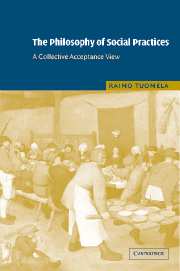Book contents
- Frontmatter
- Contents
- List of figures
- Acknowledgments
- Introduction
- 1 Collective intentionality and the construction of the social world
- 2 Collective intentionality
- 3 Conceptual activity, rule following, and social practices
- 4 An account of social practices
- 5 A Collective Acceptance account of collective-social notions
- 6 Social institutions
- 7 Social practices in a dynamic context: a mathematical analysis
- Epilogue
- Notes
- References
- Index
4 - An account of social practices
Published online by Cambridge University Press: 22 September 2009
- Frontmatter
- Contents
- List of figures
- Acknowledgments
- Introduction
- 1 Collective intentionality and the construction of the social world
- 2 Collective intentionality
- 3 Conceptual activity, rule following, and social practices
- 4 An account of social practices
- 5 A Collective Acceptance account of collective-social notions
- 6 Social institutions
- 7 Social practices in a dynamic context: a mathematical analysis
- Epilogue
- Notes
- References
- Index
Summary
INTRODUCTION
Social practices are often spoken of in social science literature, but I have not found comprehensive conceptual accounts of them in that literature (with the partial exception of the elucidations by the sociologists Giddens and Bourdieu). In philosophy, the recent rich book by Schatzki (1996) contains interesting discussions and can be recommended. In this book I will, however, make a fresh start. The basic idea is that social practices in their core sense are activities performed for social reasons of a certain broad kind, viz., shared we-attitudes (either in the I-mode or in the we-mode). My approach has as its starting point the philosophy of social action and it is quite different from previous work in this area. Using the terminology of chapter 1, the nature and role of social practices is crucially central for arguing both for the “wide” and the “narrow” constructivist programs in my sense.
The phrase “social practice” is used in many different ways, and social practices will form a very broad category of activities. For instance, there are work-related institutionalized practices. These include banking practices and teaching practices of various kinds, as well as practices for building sailing boats or violins. These practices typically involve specific and widespread techniques or ways of doing things. Accordingly, there are skills embedded here and thus better and worse ways of performing the activities constituting the social practices.
- Type
- Chapter
- Information
- The Philosophy of Social PracticesA Collective Acceptance View, pp. 78 - 121Publisher: Cambridge University PressPrint publication year: 2002



